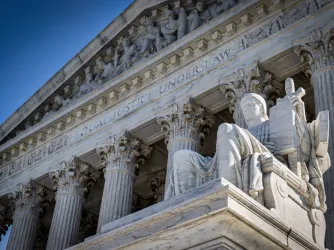Table of Contents
After denying TPUSA recognition, Lindenwood incorrectly says student organizations cannot endorse political candidates

A Lindenwood University administrator told student Cullen Dittmar that his College Republicans chapter constitution cannot include a clause stating the group will endorse political candidates. This comes just weeks after the university’s student government denied recognition to Dittmar’s proposed TPUSA chapter, apparently to avoid the controversy that may have come with recognizing the conservative student group.
Compounding the viewpoint-based refusal to allow a TPUSA chapter to form, when Dittmar pivoted to submitting a constitution to the university to form a College Republicans chapter, LU Director of Student Involvement Carynn Smith wrote a comment on the constitution stating, “Unfortunately, you cannot endorse Republicans for public office. This is not permitted based on our Institutional Non-Partisan Policy.”
LU’s Political Nonpartisanship Policy, however, rightly does not prohibit student endorsement of candidates, but only institutional endorsement. It says:
[T]he University practices political nonpartisanship. This means that no University office, organization, subdivision, student, or employee may use University resources, advertising channels, or work time to promote, assist, or express support for any particular candidate(s) pursuing election or appointment to a political office.
LU clearly acknowledges that its policy is “in no way meant to deter students or organizations on campus from engaging in political discussions and debate,” while maintaining that “Lindenwood as an institution itself, must remain politically neutral relative to candidates for office.”
LU is correct that the institution itself cannot endorse political candidates or take political stances. As a 501(c)(3) tax-exempt nonprofit, LU must remain nonpartisan. At the same time, the university’s tax-exempt status does not preclude students or student organizations from expressing their own political opinions — although we’ve seen institutions misinterpret this before . (To learn more, read FIRE’s FAQ for Political Speech on Campus.)
Earlier this week, FIRE wrote LU explaining that because it promises students free expression, it cannot prevent them from engaging in core political expression. Having been promised free expression, LU students will reasonably believe the freedom of expression LU promises encompasses the full range of speech protected by the First Amendment. As we said:
Political speech, including advocacy on behalf of political candidates, is at the core of the “freedom of expression” protected by the First Amendment. “Whatever differences may exist about interpretations of the First Amendment, there is practically universal agreement that a major purpose of that Amendment was to protect the free discussion of governmental affairs.” Promotion of a candidate for office is undoubtedly “core political speech” at the very heart of free expression, where First Amendment protection is “at its zenith.”
LU’s prohibition on student groups endorsing candidates ignores the distinction between institutional expression and the expression of its students, who are strongly presumed to speak only for themselves. Courts have held that student speech does not constitute expression on behalf of the institution. The Supreme Court made clear that the use of a public university’s facilities by a religious student group — facilities made available to other student groups on the same basis — no more committed the institution to that group’s religious views than the views of any other student group.
We told LU no reasonable person could be misled into believing LU has chosen to endorse a candidate simply because a student organization endorses that candidate, especially given that LU already recognizes student groups representing various other political parties. Instead, given LU’s free expression promises (and common sense), observers would clearly understand that the student organization was engaging in core political speech.
The university must ensure its policies and actions line up with its clear commitment to free expression.
LU responded to FIRE, claiming that the student government duly followed its review process in denying TPUSA recognition, and that it will follow suit in reviewing the College Republicans.
Our concerns are not alleviated. LU did not say the student government didn’t discriminate against TPUSA based on viewpoint. And LU did not address our concerns that the university itself is prohibiting student groups from endorsing candidates.
LU must allow Dittmar to include an endorsement-of-candidates clause as part of the College Republicans’ constitution, and the university must ensure its policies and actions line up with its clear commitment to free expression, including requiring its student government to assess proposed student organizations on a viewpoint-neutral basis.
FIRE defends the rights of students and faculty members — no matter their views — at public and private universities and colleges in the United States. If you are a student or a faculty member facing investigation or punishment for your speech, submit your case to FIRE today. If you’re faculty member at a public college or university, call the Faculty Legal Defense Fund 24-hour hotline at 254-500-FLDF (3533).
Recent Articles
Get the latest free speech news and analysis from FIRE.

The federal charges against Don Lemon raise serious concerns for press freedom

The American people fact-checked their government

California prohibits its teachers from talking about a student's gender identity to their parents. That raises First Amendment concerns.



